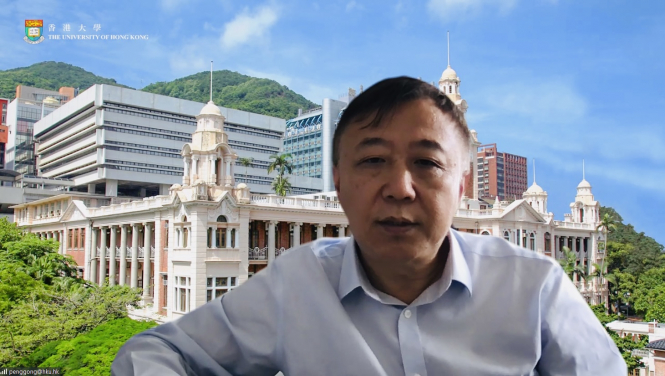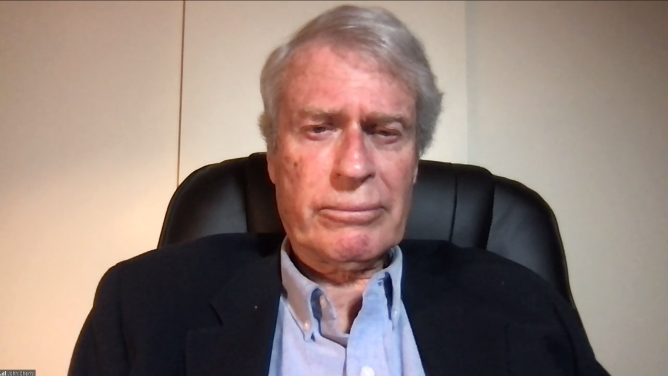Media
HKU Science presents 'Earth Day Lecture' series
to raise public awareness of environmental protection
22 Apr 2022
Destructive environmental change is already happening — acting now can reduce the risks of climate moving to ever greater extremes. Earth Day (April 22) is the day for us to remember the significance of protecting our planet Earth. To heed conservation calls and raise awareness of environmental challenges on this particular day, the Faculty of Science of the University of Hong Kong (HKU) specially presented the ‘Earth Day Lecture’ series, hoping to bring new insights into both the academic arena and the general public through lectures delivered by our Distinguished Visiting Scholar and our own renowned environmental scientists, respectively.
Professor Peng GONG, HKU Vice-President and Pro-Vice-Chancellor (Academic Development) expressed his gratitude to Professor John CHERRY of the University of Waterloo, as well as Dr. David BAKER and Dr. Alice HUGHES from HKU, for delivering these inspiring seminars. "HKU has a long tradition of excellent research on a wide range of issues related to our mother Earth. This Earth Day Lecture series marks a new level of recognition of Earth-related instruction and research by many Faculty members and students. We will continue to organise such meaningful lectures to celebrate progress in science, technology, and governance toward reaching harmony between humans and nature," said Professor Gong.
Environmental challenges associated with groundwater
One of the dominant narratives in popular press accounting for the overriding crisis of climate change is no doubt anthropogenic greenhouse gas emissions. Still, scientists have been urgently reminding the community that groundwater is also immensely important to the well-being of humanity and ecosystems. Initiated by HKU Department of Earth Sciences, Distinguished Emeritus Professor John CHERRY from the University of Waterloo, also the leader of The Groundwater Project at the University of Guelph, was invited to share his views at the lecture ‘The Condition of the Planet and Humanity Concerning Freshwater and Food; A Groundwater Viewpoint’, elaborating how groundwater serves as an essential global commodity for food security, for human health and well-being, for sustaining environmental diversity, and for adaptation given the downward projections for humanity in the context of climate change.
Professor Cherry suggested that we must acknowledge our inability to communicate the importance of groundwater. "The Planet is facing a freshwater crisis with groundwater at its heart. In some regions, aquifers supporting irrigation are going dry, causing rising food insecurity in the globalised economy. Elsewhere, two billion people who live in water poverty desperately need more wells to extract water from under-utilised aquifers. Large global financial resources are now directed at reducing greenhouse gases with little directed at the water crisis to reduce immense human suffering, worsening as drought spreads and more than a billion people are added to the global population," said Professor Cherry.
Dr Man Hoi LEE, Head of HKU Earth Sciences, thanked the distinguished speaker and said, "We are honoured to host Professor Cherry, who is widely recognised for his work in groundwater research, protection and management, for his lecture on a vital but often underappreciated component of the Earth's water cycle: groundwater, which contains 99% of the world's fresh liquid water."
Data-driven solutions for environmental challenges
Science cannot stand alone. Bridging the gap between science and society helps in constructing the way for a sustainable future. The public seminars under ‘Data-driven Solutions for Environmental Challenges’ organised by HKU School of Biological Sciences, covered the topic beyond the scope of scientific research – how we bridge science with enterprise and how to utilise biodiversity data for developing effective conservation policy and management.
"Developing the most effective solutions relies on a holistic understanding of data gaps and the limits of the application of our knowledge so we can have confidence in our proposed solutions, and translate them into a context where they work within the bounds of society and can translate into real-world action," said one of the speakers Dr Alice HUGHES.
"Earth Day is an opportune time to reflect on our collective impacts on nature. There is an old paradigm that economic development and conservation are mutually exclusive, and incompatible. Today, we are opening our eyes to a new future where conservation and sustainability are compatible, and profitable. To achieve this, we must face head-on the challenge of subverting greenwashing and that requires well-trained scientists and engineers to provide solutions and careful accounting," another speaker Dr David BAKER added.
In addition to the seminar series, this year the Faculty of Science also launched an ‘Environmental Science Chalk Talk’, which served as a very interactive way to engage undergraduate students to exchange ideas and discuss their potential career paths in environmental science and sustainability.
The organiser Dr Caroline DINGLE commented that the Chalk Talks were designed to help students learn about the many different ways that scientific knowledge could be applied to tackle complex environmental problems. "Whether students pursue careers as practising environmental scientists, or whether they use scientific data to make evidence-based decisions in other fields, having a good understanding of the scientific process will help them to evaluate and apply scientific evidence in the future."
Image download and caption: https://www.scifac.hku.hk/press
For media enquiries, please contact Ms Casey To, External Relations Officer (tel: (852) 3917-4948; email: caseyto@hku.hk)/ Ms Cindy Chan, Assistant Director of Communications of HKU Faculty of Science (tel: (852) 3917-5286; email: cindycst@hku.hk).





